Discovery Institute Science Collection (10 vols.)
Digital Logos Edition
Overview
The Discovery Institute Science Collection (10 vols.) offers penetrating insights into many issues of our time, including evolution, intelligent design, bioengineering, moral relativism, and the role of government. Explore the life and ideas of the cofounder of the theory of evolution via natural selection, learn about how butterflies point toward intelligent design, and draw on the timeless wisdom of C. S. Lewis with this cutting-edge collection.
With the Logos edition of Discovery Institute Science Collection (10 vols.), you get an abundance of applicable, insightful resources. You can easily research intelligent design and access an assortment of useful resources and perspectives from a variety of pastors and theologians.

Key Features
- Analyzes “theistic evolution”
- Explores the science and artistry of butterflies
- Discusses how butterflies challenge Darwinian evolution
- Investigates questions in the human origins debate
- Critiques Judge John E. Jones III’s controversial decision in Kitzmiller vs. Dover
Product Details
- Title: Discovery Institute Science Collection
- Publisher: Discovery Institute
- Volumes: 10
- Pages: 1,678
Individual Titles
- Alfred Russel Wallace: A Rediscovered Life by Michael A. Flannery
- God and Evolution: Protestants, Catholics, and Jews Explore Darwin’s Challenge to Faith edited by Jay W. Richards
- God and Evolution: Discussion Guide edited by Jay W. Richards
- In the Beginning and Other Essays on Intelligent Design by Granville Sewell
- Metamorphosis: The Case for Intelligent Design in a
NutshellChrysalis edited by David Klinghoffer
- Science and Human Origins by Ann Gauger, Douglas Axe, and Casey Luskin
- Signature of Controversy: Responses to Critics of Signature in the Cell edited by David Klinghoffer
- The Magician’s Twin: C. S. Lewis on Science, Scientism, and Society edited by John G. West
- Traipsing into Evolution: Intelligent Design and the Kitzmiller vs. Dover Decision by David K. Dewolf, John G. West, Casey Luskin, and Jonathan Witt
- Why Is a Fly Not a Horse?: Dimenticare Darwin by Giuseppe Sermonti
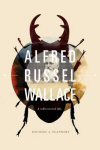
Alfred Russel Wallace: A Rediscovered Life is a new biography of the co-discoverer of the theory of evolution by natural selection and one of the nineteenth century’s most intriguing scientists. Its provocative thesis is that Wallace, in developing his unique brand of evolution, presaged modern intelligent design theory. Wallace’s devotion to discovering the truths of nature brought him through a lifetime of research to see genuine design in the natural world. This was Wallace’s ultimate heresy, a heresy that exposed the metaphysical underpinnings of the emerging Darwinian paradigm.
Flannery’s riveting tale of rediscovery provides convincing new evidence that Alfred Russel Wallace—the acknowledged co-discoverer of evolutionary theory—supported an argument from design for all forms of life which, in many ways, anticipated modern intelligent design thinking. This fascinating work of intelligent history recasts a new, more complete and lasting image of the once all too elusive Wallace.
—Philip K. Wilson, director, The Doctors Kienle Center for Humanistic Medicine
Michael Flannery has written a superb book that in its passion and subjective honesty offers a cogent and articulate defense of Alfred Wallace’s theory of intelligent design, with all its moral and ethical implications, as a counterpoint to the materialistic worldview that came to be known as Darwinism.
—John S. Haller, emeritus professor of history and medical humanities, Southern Illinois University
In this lucidly written book Michael Flannery shows that Alfred Russel Wallace, the co-discoverer of the theory of evolution by natural selection, thought the theory was incomplete—the guidance of a higher power was needed to explain nature. Wallace’s ideas show strongly that the godless view of evolution taken by so many modern evolutionists is not forced on them by the evidence; rather they assume it in spite of the evidence.
—Michael Behe, professor of biochemistry, Lehigh University
Michael A. Flannery is a professor and associate director for Historical Collections at the Lister Hill Library of the Health Sciences at the University of Alabama in Birmingham.
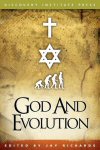
Can you believe in God and Darwin at the same time? What is “theistic” evolution, and how consistent is it with traditional theism? What challenges does Darwin’s theory pose for Protestants, Catholics, and Jews? Is it “anti-science” to question Darwinian Theory? Explore these questions and more in God and Evolution, edited by Jay Richards. Contributors include:
- William Dembski
- Stephen Meyer
- Denyse O’Leary
- David Klinghoffer
- Jonathan Wells
- John West
- Jonathan Witt
- Casey Luskin
- Logan Paul Gage
Jay W. Richards is the director of research at Discovery Institute’s Center for Science and Culture. He is the author of several books including The Untamed God and Money, Greed, and God, and coauthor of The Privileged Planet with astronomer Guillermo Gonzalez. He earned his PhD in philosophy and theology from Princeton Theological Seminary. His work has been covered in publications such as The New York Times and The Washington Post, and he has appeared on many national radio and TV programs, including Larry King Live.

This discussion guide contains suggestions for how to use God and Evolution for a 10-session discussion course.
Jay W. Richards is the director of research at Discovery Institute’s Center for Science and Culture. He is the author of several books including The Untamed God and Money, Greed, and God, and coauthor of The Privileged Planet with astronomer Guillermo Gonzalez. He earned his PhD in philosophy and theology from Princeton Theological Seminary. His work has been covered in publications such as The New York Times and The Washington Post, and he has appeared on many national radio and TV programs, including Larry King Live.
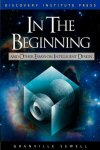
In this wide-ranging collection of essays on origins, mathematician Granville Sewell looks at the big bang, the fine-tuning of the laws of physics, and the evolution of life. He concludes that while there is much in the history of life that seems to suggest natural causes, there is nothing to support Charles Darwin’s idea that natural selection of random mutations can explain major evolutionary advances. Sewell explains why evolution is a fundamentally different and much more difficult problem than others solved by science, and why increasing numbers of scientists are now recognizing what has long been obvious to the layman, that there is no explanation possible without design. This book summarizes many of the traditional arguments for intelligent design, but presents some powerful new arguments as well.
Calm, thoughtful, and far-ranging.
—William Dembski, senior fellow, Discovery Institute’s Center for Science and Culture
Sewell provides delightful and wide-ranging commentary on the origins debate and intelligent design.
—Cornelius G. Hunter, adjunct professor of science and religion, Biola University
Granville Sewell is a professor of mathematics at the University of Texas in El Paso. He has written three books on numerical analysis and is the author of a widely-used finite element computer program.
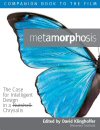
Butterflies are the latest icon of intelligent design. They dazzle us with their beauty and charm. Many of us intuitively grasp that something in the fluttering shape of a Monarch, Yellow Swallowtail, Gossamer-Winged Blue, or Cloudless Sulpher butterfly hints at depths of purpose and design in nature, gesturing wordlessly toward a meaning that infinitely transcends its small and delicate self. Can our intuition about butterflies be confirmed in scientific terms?
Yes, it can.
The magnificent new Illustra Media documentary, Metamorphosis, documents the case for intelligent design based on the wonders of butterfly metamorphosis and migration. In this companion book, scientists, philosophers, and historians expand on the scientific arguments suggested in the film, offering the first comprehensive explanation of the science that substantiates our intuition about what a butterfly means.
Including contributions by world-renowned butterfly expert Bernard d’Abrera and by science historian Michael Flannery, Metamorphosis: The Case for Intelligent Design in a Nutshell Chrysalis is highlighted by a detailed essay by Drs. Ann Gauger and Paul Nelson. In “Stranger than Fiction: The Riddle of Metamorphosis,” Gauger and Nelson comprehensively lay out the scientific evidence for intelligent design from the life, death, and transformation of the caterpillar. They tell us what Darwinian evolutionists say in response to the challenge raised by Metamorphosis and why, in contemporary scientific terms, the Darwinian reply falls short.
David Klinghoffer is a senior fellow at the Discovery Institute and the author of six books including, with Senator Joseph Lieberman, The Gift of Rest: Rediscovering the Beauty of the Sabbath and the spiritual memoir The Lord Will Gather Me In: My Journey to Jewish Orthodoxy.
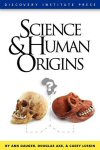
Science and Human Origins, the provocative new book from Discovery Institute Press, boldly addresses some of the most popular evolutionary arguments pertaining to controversial claims that humans and apes are related through common ancestry.
In Science and Human Origins three scientists challenge the claim that undirected natural selection is capable of building a human being. The authors critically assess fossil and genetic evidence that human beings share a common ancestor with apes, and debunk recent claims that the human race could not have started from an original couple.
Ann Gauger is a senior research scientist at Biologic Institute. She holds a PhD in developmental biology from the University of Washington and did her post-doctoral fellowship at Harvard University.
Douglas Axe is a molecular biologist and the director of Biologic Institute. He received his PhD from Caltech and previously held postdoctoral and research scientist positions at Cambridge University and the Babraham Institute in Cambridge.
Casey Luskin is a research coordinator at Discovery Institute’s Center for Science and Culture. He earned his MS in earth sciences from the University of California in San Diego and conducted geological research at the Scripps Institution for Oceanography.
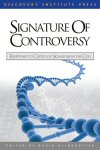
Published in 2009, Signature in the Cell: DNA and the Evidence for Intelligent Design is recognized as establishing one of the strongest pillars underlying the argument for intelligent design. To call the book fascinating and important is an understatement. No less interesting in its way, however, was the critical response and it is with that this book is concerned. Despite Signature in the Cell being written about in print and online by numerous friends and foes of intelligent-design theory, few—if any—of the critics really grappled with the substance of Meyer’s argument. This is remarkable and telling. In this book, defenders of Signature in the Cell analyze the hostile response.
David Klinghoffer is a senior fellow at the Discovery Institute and the author of six books including, with Senator Joseph Lieberman, The Gift of Rest: Rediscovering the Beauty of the Sabbath and the spiritual memoir The Lord Will Gather Me In: My Journey to Jewish Orthodoxy.
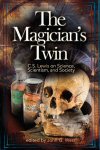
Beloved for his Narnian tales for children and his books of Christian apologetics for adults, best-selling author C. S. Lewis also was a prophetic critic of the growing power of scientism in modern society, the misguided effort to apply science to areas outside its proper bounds. In this wide-ranging book of essays, contemporary writers probe Lewis’ warnings about the dehumanizing impact of scientism on ethics, politics, faith, reason, and science itself. Issues explored include Lewis’ views on bioethics, eugenics, evolution, intelligent design, and what he called “scientocracy.”
C. S. Lewis’ many admirers will be eager to read this collection of articles . . . The book contains a timely and well-reasoned chapter about Lewis and intelligent design.
—Phillip E. Johnson, Jefferson E. Peyser Professor of Law, University of California, Berkeley School of Law
The Magician’s Twin elucidates C. S. Lewis’ profound contribution to our understanding of the natural world, its design and its functions, and its relationship to the supernatural world, two worlds that we inhabit simultaneously, if somewhat obliviously. This collection of essays shrewdly corrects some misapprehensions of Lewis’ views on evolution, the character of reason, and the role of empirical science in adjudicating the answers to life’s most important questions. Its greatest service, nevertheless, is foregrounding for 21st Century readers the threats to freedom that unchecked scientism engenders (the ‘twin’ referred to in the title)—threats that Lewis so relentlessly and prophetically and bravely warned us about in his era.
—Bruce L. Edwards, professor of English and associate dean, Distance Education and International Programs, Bowling Green State University
Some Darwinians . . . claim that C. S. Lewis is fighting alongside them. The Magician’s Twin proves that he is not.
—Marvin Olasky, editor-in-chief, World News Group
John G. West is the associate director of Discovery Institute’s Center for Science and Culture. He is coeditor of the award-winning C. S. Lewis Readers’ Encyclopedia and author of The Politics of Revelation and Reason and Darwin Day in America. He has been interviewed by Time, Newsweek, USA Today, and The New York Times, as well as appearing on CNN and Fox News. He holds a PhD in government from Claremont Graduate University and formerly was the chair of the Department of Political Science and Geography at Seattle Pacific University.

A clear solution to the debate over biological origins has evaded scientists and philosophers for millennia. Since the ancient Greeks, thousands of pages of debate from scholars on all sides have yielded two types of answers: those which invoke only material causes and those which explore the possibility that intelligence had a direct role in shaping life. Yet in 2005, one United States federal judge thought he could settle this longstanding question of science and philosophy once and for all.
Traipsing into Evolution is a critique of federal Judge John E. Jones’ decision in the Kitzmiller vs. Dover case, the first trial concerning the constitutionality of teaching intelligent design in public schools. In this concise yet comprehensive response, Discovery Institute scholars and attorneys show how Judge Jones’ Kitzmiller decision was based upon faulty reasoning, non-existent evidence, and a serious misrepresentation of the scientific theory of intelligent design. Despite Judge Jones’ protestations to the contrary, his attempt to use the federal bench to declare evolution a sacred cow turns out to be a textbook case of good-old-American judicial activism.
Mark Twain is said to have once refuted his own obituary by proclaiming that “the report of my death was an exaggeration.” Traipsing into Evolution rebuts similar reports about the “death of intelligent design” from media pundits and the Darwinist establishment in the wake of Kitzmiller vs. Dover.
This book also includes a lengthy response to the ruling from Lehigh University biochemist and senior Discovery fellow Michael Behe, the lead expert witness for the defense at the trial, entitled “Whether ID Is Science: Michael Behe’s Response to Kitzmiller vs. Dover.”
David K. Dewolf is a senior fellow at Discovery Institute and law professor at Gonzaga University.
John G. West is the associate director of Discovery Institute’s Center for Science and Culture. He is coeditor of the award-winning C. S. Lewis Readers’ Encyclopedia and author of The Politics of Revelation and Reason and Darwin Day in America. He has been interviewed by Time, Newsweek, USA Today, and The New York Times, as well as appearing on CNN and Fox News. He holds a PhD in government from Claremont Graduate University and formerly was the chair of the Department of Political Science and Geography at Seattle Pacific University.
Casey Luskin is a program officer in Public Policy and Legal Affairs with the Center for Science and Culture. He earned his MS in earth sciences from the University of California in San Diego and conducted geological research at the Scripps Institution for Oceanography.
Jonathan Witt is a senior fellow at Discovery Institute.
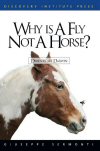
In Why Is a Fly Not a Horse?, Giuseppe Sermonti explains why evolution resembles a “paradigm” more than it does an explanation. Scientists assume that the theory and its implications (such as universal common descent) are true, but no one can ever explain the details of precisely why it is. According to Sermonti, naturalistic theories of biological origins are science-stoppers.
Sermonti explains that biology has advanced greatly when naturalistic theories of biological origins have been disproved. For example, in 1688 Francesco Redi performed an experiment which refuted the notion that flies come from rotting meat—Redi discovered that flies actually come from worms that hatch from eggs laid in rotting biological matter which subsequently develop into flies. The recognition that flies come from eggs rather than meat fostered our early understanding of biological development, but one theory of spontaneous generation had to die before the advance was made.
Sermonti recounts that the field became stalled when the early evolutionist Comte de Buffon imagined that everything from fleas to the hippopotamus emerged from the primordial slime. Providing an Italian perspective on the history of biology, Sermonti explains that an Italian naturalist named Spallanzani refused to just accept spontaneous generation as the easy answer, and through a series of carefully observed experiments, came to the conclusion that “omne vivium ex ovo” (all life comes from eggs). Spontaneous generation was finally disproved by Pasteur’s experiments nearly a century later. This was a fact lamented by Darwin, who claimed that Pasteur “denied spontaneous generation.” Despite Pasteur’s “denial,” biology progressed.
Sermonti turns to the primary question of his book: Why is a fly not a horse? According to Sermonti, developmental genes are widely similar across various species. Providing a tour of genetic development, Sermonti finds that genes alone may not be enough to account for differences among the species, something that would pose a profound challenge to Darwin’s theory.
Giuseppe Sermonti is a retired professor of genetics at the University of Perugia and the chief editor of Rivista di Biologia/Biology Forum, one of the oldest still-published biology journals in the world. He is the author of seven books, including Genetics of Antibiotic-producing Microorganisms, Dopo Darwin, Fiabe dei fiori, and Il mito della grande madre.